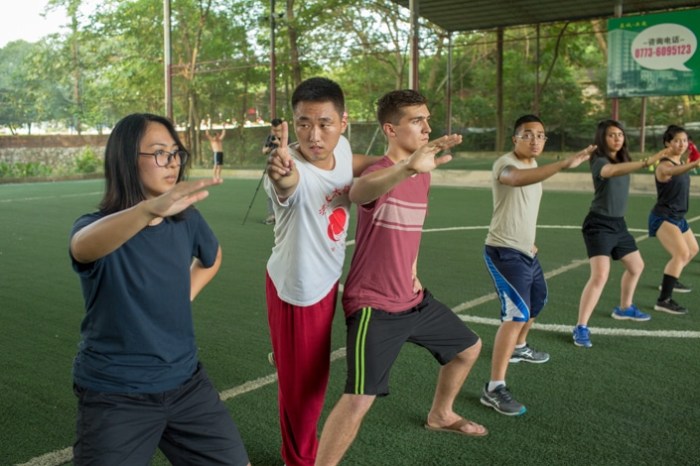Learn how to write sure in Chinese language? Navigating the nuances of settlement within the Mandarin language can also be tough, particularly when taking into consideration formal and casual contexts. This information delves into the attention-grabbing international of expressing confirmation, exploring the delicate variations in quite a lot of dialects, social scenarios, and cultural contexts. Get in a position to release the secrets and techniques of claiming “sure” in essentially the most suitable method, whether or not you might be ordering meals at a bustling boulevard marketplace or accomplishing a trade deal.
From formal greetings to informal conversations, this complete information will remove darkness from the alternative ways to precise “sure” in Chinese language. We will read about the formal and casual diversifications, highlighting the particular contexts by which every is used, after which delve into the intricate international of dialects and regional diversifications. Moreover, we’re going to get to the bottom of the social and cultural elements that form the expression of settlement in Chinese language society, enabling you to keep in touch with self assurance and cultural sensitivity.
Formal and Casual Techniques to Specific “Sure”

Finding out methods to say “sure” in Chinese language is going past a easy translation. The nuances in tone and politeness considerably affect how you might be perceived. Figuring out those nuances is an important for efficient conversation and warding off misunderstandings.
Formal and Casual Expressions
Alternative ways of claiming “sure” in Chinese language replicate the extent of ritual in a dialog. That is an important for navigating social scenarios and appearing admire to others. Formal expressions are utilized in skilled settings or when addressing anyone older or of upper standing. Casual expressions are used amongst buddies, circle of relatives, and friends.
| Chinese language Word | Pinyin | English Translation | Context |
|---|---|---|---|
| 是 (shì) | shì | Sure | In most cases formal, but additionally often utilized in casual settings. Can be utilized when agreeing with a commentary or responding to a query. |
| 嗯 (ēn) | ēn | Sure/Hmm | Casual and informal, continuously used as a brief confirmation. |
| 对 (duì) | duì | Sure/Proper | Formal and casual. Frequently used to precise settlement with a commentary or to recognize one thing is right kind. |
| 好 (hǎo) | hǎo | Ok/Excellent/Sure | Very flexible. May also be formal or casual, continuously used to simply accept tips or requests. |
| 行 (xíng) | xíng | Ok/Sure/All proper | Casual, implying settlement and acceptance. Frequently used amongst buddies. |
| 可以 (kěyǐ) | kěyǐ | Sure/Ok/Imaginable | Formal or casual. Used when agreeing to an offer or request. Frequently used to precise permission. |
Those expressions display a spectrum of ritual, from the fairly formal “shì” to the very casual “嗯”. The collection of expression without delay affects the full tone of the dialog.
Nuances in That means and Utilization
The which means and utilization of various “sure” expressions in Chinese language aren’t all the time easy. For instance, “shì” is fairly impartial, whilst “嗯” is extra of a comfortable confirmation. “好” and “行” are very often used and produce acceptance and settlement. “可以” has a moderately extra nuanced which means, implying permission or chance along with settlement.
Other contexts affect the suitable selection. When talking to a awesome at paintings, the usage of a extra formal expression like “shì” or “duì” is in most cases most popular. Casual expressions like “嗯” or “行” are appropriate when speaking with shut buddies or circle of relatives.
Sentence Constructions and Tone, Learn how to write sure in chinese language
The collection of “sure” expression impacts the tone and emphasis of a sentence.
| Sentence Construction | Chinese language Word | Pinyin | English Translation | Tone |
|---|---|---|---|---|
| Affirmative commentary | 是的,我明白。 | Shì de, wǒ míngbái. | Sure, I perceive. | Formal, well mannered |
| Settlement with an offer | 好,我去买。 | Hǎo, wǒ qù mǎi. | Ok, I’m going to move purchase it. | Casual, agreeable |
| Affirmation | 嗯,没问题。 | En, méi wèntí. | Hmm, no downside. | Casual, accepting |
| Granting permission | 可以,你去吧。 | Kěyǐ, nǐ qù ba. | Ok, move forward. | Formal or casual, relying on context |
Those examples exhibit how the similar fundamental concept (“sure”) can also be expressed with other tones and ranges of ritual, considerably impacting the full conversation.
Sure in Other Dialects and Regional Diversifications

Other Chinese language dialects, every with its personal distinctive historical past and evolution, show off diversifications in how they specific “sure.” Those diversifications continuously replicate the nuances of the language and supply perception into the linguistic variety throughout the Chinese language language circle of relatives. Figuring out those variations can assist bridge conversation gaps and recognize the richness of the language.Figuring out dialectal diversifications in expressing “sure” is going past easy translation.
It incorporates a deeper figuring out of cultural context and the way other areas specific settlement and confirmation. Spotting those subtleties may end up in extra significant interactions and steer clear of doable misunderstandings.
Mandarin
Mandarin, essentially the most broadly spoken number of Chinese language, most often makes use of “是 (shì)” as the most typical strategy to say “sure.” It is a flexible and universally understood expression. Diversifications in tone and context would possibly result in delicate variations, however “shì” stays the core confirmation. In spoken Mandarin, the tone of “shì” can range moderately to put across other ranges of confirmation or emphasis.
Cantonese
In Cantonese, the average strategy to say “sure” is “係 (hai).” Whilst very similar to Mandarin with regards to serve as, “hai” carries its personal tonal nuances and is essentially utilized in spoken Cantonese. In written Cantonese, “係” is continuously used, regardless that possible choices like “係呀” (hai ya) or “係嘅” (hai ge) also are discovered, conveying moderately other levels of confirmation.
Taiwanese
Taiwanese Chinese language, with its distinct linguistic options, provides a number of tactics to precise “sure.” “是 (sì)” and “好 (hó)” are often used, mirroring using those phrases in Mandarin. On the other hand, particular expressions may well be hired specifically scenarios, influenced by means of the cultural and linguistic context of Taiwan.
Desk of Diversifications
| Dialect | Written Shape | Spoken Shape | Instance | That means/Context |
|---|---|---|---|---|
| Mandarin | 是 (shì) | 是 (shì) | 是,我明白了。(Shì, wǒ míngbái le.) | Sure, I perceive. |
| Cantonese | 係 (hai) | 係呀 (hai ya) | 係呀,我知。(Hai ya, wo zi.) | Sure, I do know. |
| Taiwanese | 是 (sì) / 好 (hó) | 是 (sì) / 好 (hó) | 是,我準備好了。(Sǐ, wǒ zhǔnbèi hǎole.) | Sure, I am in a position. |
The desk above supplies a concise comparability of the way “sure” is expressed in written and spoken bureaucracy throughout Mandarin, Cantonese, and Taiwanese dialects. Observe that whilst those are not unusual expressions, particular utilization can range relying at the area and the speaker’s particular person desire.
Sure in Other Social and Cultural Contexts
Chinese language tradition puts a powerful emphasis on social hierarchy and admire for elders and the ones in positions of authority. This admire extends to the way in which “sure” is expressed, influencing the selection between formal and casual language. The nuances of “sure” can subtly keep in touch a degree of deference or familiarity, making it an important for figuring out social cues.The expression of “sure” in Chinese language displays the social and cultural context, and its formality varies a great deal.
Opting for the suitable shape will depend on elements equivalent to the connection between the audio system, the environment, and the extent of ritual required. This sensitivity is important for efficient conversation and warding off misunderstandings.
Formal Scenarios
In formal settings, like trade conferences, task interviews, or interactions with senior figures, a extra formal expression of “sure” is anticipated. This conveys admire and professionalism. Examples come with the usage of “shì” (是), which is a impartial and broadly appropriate formal “sure.” The use of extra elaborate or well mannered words like “duì” (对) or “hǎo” (好), whilst applicable, are moderately much less formal than “shì”.
Casual Scenarios
Conversely, casual settings, equivalent to conversations with buddies, circle of relatives, or friends, permit for extra comfy and informal expressions of settlement. The use of phrases like “嗯” (en), or a easy “hāo” (好) conveys a way of familiarity and straightforwardness. Those casual “sure” choices are appropriate for day by day interactions the place formality is not a concern.
Cultural Norms and Hierarchy
Respecting social hierarchy is an important in Chinese language tradition. In interactions with superiors, elders, or the ones in positions of authority, the usage of extra formal expressions of “sure” is very important to turn admire. Conversely, in informal settings with friends, casual “sure” expressions are completely applicable.
Desk of “Sure” Utilization in Other Social Settings
| Social Surroundings | Suitable “Sure” Expressions | Examples |
|---|---|---|
| Trade Assembly (with a awesome) | 是 (shì), 对 (duì) | “是,我明白了。” (Shì, wǒ míngbái le.
|
| Activity Interview | 是 (shì), 好的 (hǎo de) | “好的,谢谢。” (Hǎo de, xièxie.
|
| Dialog with a senior circle of relatives member | 是 (shì), 好的 (hǎo de) | “是,您说的对。” (Shì, nín shuō de duì.
|
| Dialog with a pal | 嗯 (en), 好 (hǎo) | “嗯,我知道了。” (En, wǒ zhīdào le.
|
| Informal dialog with a colleague | 好 (hǎo), 嗯 (en) | “嗯,这个主意不错。” (En, zhège zhǔyi bùcuò.
|
Remaining Phrase: How To Write Sure In Chinese language
In conclusion, mastering the artwork of claiming “sure” in Chinese language is going past merely figuring out the literal translation. It calls for figuring out the subtleties of context, social hierarchy, and cultural norms. Via greedy the formal and casual expressions, the various dialects, and the nuanced social contexts, you can be provided to navigate Chinese language conversations with grace and precision.
Whether or not you are a language learner or a seasoned traveler, this information will empower you to precise settlement successfully and accurately.
Key Questions Replied
What are some casual tactics to mention “sure” in Chinese language?
Casual tactics to mention “sure” in Chinese language come with “嗯 (en)” which is a handy guide a rough nod or “对 (dui)” which is extra direct. Your best option will depend on the placement and your dating with the individual you might be talking with.
How does the usage of “sure” range in several Chinese language dialects?
Dialects like Cantonese may use other vocabulary totally, and the pronunciation of the an identical phrase may fluctuate considerably from Mandarin. Even inside Mandarin, other areas may have slight diversifications.
Is there a particular strategy to say “sure” in a trade assembly?
In a proper trade environment, the usage of the extra formal expressions like “是 (shi)” is an important. A easy “sure” can infrequently appear overly informal, impacting your skilled symbol.
What are some not unusual errors to steer clear of when pronouncing “sure” in Chinese language?
The use of the incorrect tone or expression can put across the other which means or seem disrespectful. Take into accout of the context and make a selection the suitable word.
